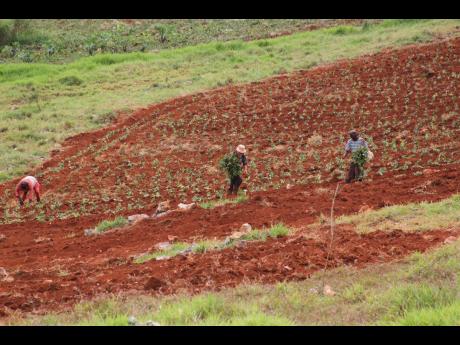Theresa Rodriguez-Moodie | Public health cannot be sacrificed for economic development
In January 2023, the Supreme Court of Judicature of Jamaica granted injunctive relief to nine claimants who requested that bauxite mining not continue in sections of St Ann and Trelawny until the constitutional case they had filed was heard, scheduled for November 2023. Since the decision, supporters of the bauxite-alumina industry have been vocal, and media headlines have included words like ‘death knell’. The supporter’s two main arguments have been that:
– The industry is far more important to the economy than any environmental impact or infringement of constitutional rights of Jamaicans, and these harms are consistently downplayed;
– Environmental advocates are just stirring up trouble and must take responsibility for any economic fallout. The Jamaica Environment Trust (JET) has been specifically mentioned in an advertorial by Discovery Bauxite Partners (DPB, formerly known as Noranda Jamaica Bauxite Partners II), and a recent article written by Lance Neita both published in The Gleaner.
The latter argument is the standard ‘attack the messenger’ response and is meant to intimidate and scapegoat. The stigmatisation of environmental rights defenders paves a path to more serious acts of intimidation and violence, and this language is deplorable.
The constitutional claim was filed on July 29, 2022, with respect to Special Mining Leases (SML) permitting bauxite mining in sections of St Ann and Trelawny. The claimants, who are from St Ann, assert a number of impacts to their health and quality of life, including that the impacts of bauxite mining pose a risk of irreparable harm to their constitutional rights.
The Supreme Court decision stated that Noranda Jamaica Bauxite Partners II (now DBP) are restrained from continuing any exploring, mining, or other activity pursuant to or in reliance on Special Mining Lease 173, due to the apparent risk of irreparable harm to the claimants/applicants and that damages would not be an adequate remedy. Secondly, the requirement that the claimants/applicants give an undertaking as to damages, in respect of their application, was waived.
MISCONCEPTIONS
I would like to address a few misconceptions and once again reiterate several of the findings from JET’s 2020 publication Red Dirt: A Multidisciplinary Review Of The Bauxite-Alumina Industry In Jamaica. The findings of the report have never received a substantive rebuttal from either the industry or the Government of Jamaica (GOJ):
• The constitutional court case was not filed or led by JET. We, however, support the ventilation of these serious matters in court, especially due to the steadfast refusal of the bauxite-alumina industry or the GOJ to address the environmental and public-health concerns in any meaningful way.
• JET has never called for the closure of the bauxite-alumina industry. Instead, we have repeatedly called for the creation of a transition plan out of an economic activity which has caused demonstrable harm to rural lives, livelihoods, public health and the environment, for greater transparency, for improvements in the air-quality regulations, and greater monitoring and enforcement of the regulatory framework as long as it continues to operate.
• JET has never misled the public with respect to the Cockpit Country Protected Area (CCPA) and mining in SML 173. The CCPA is closed to mining, and no company has been granted permission to mine in this area. Cockpit Country, however, is much larger than the protected area, and SML 173 lies within landforms that are cockpit karst, encompasses place names that show they are part of Cockpit Country’s history, and contain important historical, cultural and archaeological assets, which will be put at risk by bauxite mining. SML 173 is also within the watershed protection area of a major river, the Rio Bueno.
• Despite decades of health complaints by community members, only one public health impact study was conducted by the GOJ in 2008 regarding the expansion of the Jamalco plant in Clarendon. Those impacted by dust due to mining are compensated anywhere between J$500 per room per household monthly to $8,500 per household every three months. RED DIRT estimated that health costs caused by the bauxite-alumina industry in Jamaica for only three pollutants are between US$2.9 billion – US$13 billion annually.
• While some lands have been reclaimed, many farmers are adamant that soil fertility has been lost due to bauxite mining. The majority of rehabilitated mined-out pits have not met the standard of restoring agricultural productivity.
• The estimated social costs of the industry are far greater than the economic benefits. Simply put, the economic gains from bauxite-alumina are not worth the environmental destruction and health impacts on communities.
CONFLICTING REPORTS
Finally, there are conflicting reports on the importance of the industry to Jamaica’s economy. We have heard from supporters like Mr Neita that Jamaica’s economy cannot do without it. Yet a review of published data suggests that it generates approximately 1.5 per cent of Jamaica’s Gross Domestic Product (GDP). The Economic and Social Survey Jamaica, 2021 report states that in 2021, with retained inflows, the industry represented six per cent of total exports and three per cent of total foreign exchange inflows. In 2022, less than 0.4 per cent of the employed labour force was employed by the industry (2023-24 Fiscal Policy Paper). For comparison, agriculture contributes around eight per cent to the GDP and employs 14 percent.
While the 70-year bauxite-alumina industry has generated some financial benefits in the early years, albeit poorly distributed, and which JET’s study conceded, it is unsustainable, destroys the environment, and compromises the health and welfare of those who live in the proximity of both mining and processing. Given the requirements of our Charter of Fundamental Rights and Freedoms, public health and the environmental heritage cannot be sacrificed for economic development. It is time to put away the facile greenwashing arguments and stop blindly supporting an industry that has caused so much damage to the natural environment and harm to public health.
- Theresa Rodriguez-Moodie, PhD, is an environmental scientist and the CEO of the Jamaica Environment Trust. Send feedback to jamaicaenvironmenttrust@gmail.com.


